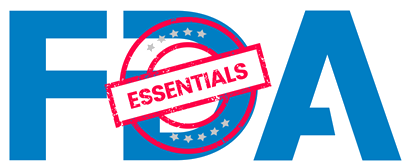Menu
FSVP & Food Safety

FSVP Plan
The Foreign Supplier Verification Program (FSVP) is how importers verify their foreign supplier’s compliance with safety…
FSVP Plan
The Foreign Supplier Verification Program (FSVP) is how importers verify their foreign supplier’s compliance with safety requirements. Avoid automatic detentions and FDA import alerts with an easy to use plan.
Use our FSVP expertise to avoid FDA import alerts, failed inspections, and supply chain disruptions.
- Get your plan done quickly
- Relax about the process with “easy to use” forms
- Avoid the stress and uncertainty of a failed FDA FSVP Plan inspection
- Get locked in pricing with our honest flat-fees
The FDA’s Foreign Supplier Verification Program (FSVP) requires importers to verify that their foreign suppliers meet U.S. food safety standards. The program aims to ensure that imported foods are as safe as those produced domestically.
Key Terms and Definitions:
- Importer means the U.S. owner or consignee of an article of food being offered for import. If there is no U.S. owner or consignee of an article of food at the time of U.S. entry, the importer is the U.S. agent or representative of the foreign owner or consignee at the time of entry, as confirmed in a signed statement of consent to serve as the importer under this subpart.
- Foreign Supplier means an entity out of the U.S. that manufactures, processes, packs, or holds food for export to the U.S.
- Hazard Analysis means the process of identifying and evaluating potential hazards (and controls) associated with a food product.
- Verification means an activity chosen by the importer for verifying that the supplier has met food safety standards.
- Preventive Controls means controls implemented in the supply chain to prevent or mitigate the risk of a hazard occurring.
- Qualified Individual an individual with the required level of education, training, or experience necessary to develop and implement a company’s FSVP.
Read More

Food Safety Plan / Preventive Controls
Preventive Controls and Food Safety plans ensure safe food production primarily through controlling critical hazards within your…
Food Safety Plan / Preventive Controls
Preventive Controls and Food Safety plans ensure safe food production primarily through controlling critical hazards within your production. Getting your plan in place will mean better FDA inspections and less FDA interference by regulators.
Get your Preventive Controls & Food Safety Plan right for better FDA facility inspection results.
- Get price certainty with flat-fee pricing
- Keep production moving while we handle the regulatory issues
- Stop stressing about future audits with our expert review
- Let us worry about responding to FDA, while you keep producing
A Food Safety Plan is a major part of compliance with the Food Safety Modernization Act (FSMA). The Safety Plan outlines activities a food company takes to prevent foodborne illness. The plan consists of several key elements that must be incorporated to meet FDA requirements. The plan must include a hazard analysis identifying the potential hazards associated with its foods. The plan must identify the Critical Control Points (CCPs) and identify where Preventive Controls are applied to controls hazards. Preventive Controls also include sanitation controls, supplier controls, and environmental controls, as well as process controls like time and temperature controls. A Food Safety Plan will also include procedures to verify that Preventive Controls are being carried out and are effective.
Preventive controls means those risk-based, reasonably appropriate procedures, practices, and processes that a person knowledgeable about the safe manufacturing, processing, packing, or holding of food would employ to significantly minimize or prevent the hazards identified under the hazard analysis that are consistent with the current scientific understanding of safe food manufacturing, processing, packing, or holding at the time of the analysis.
Recall Plan
FDA requires all food facilities to have a written recall plan under the FDA Food Safety Modernization Act (FSMA). The recall plan must specify the steps to be taken when a company recalls its products, as well as who will be in charge of carrying them out. It must also include procedures for informing consumers, suppliers, and other involved entities about the recall.
Creating a recall plan is important for ensuring that your food facility can respond quickly and effectively in the event of a food safety issue. By using a professionally created plan your company can minimize the impact of a recall on consumers and reduce the risk of foodborne illness.
Read More

Recall Plan
FDA requires all food facilities to have a written recall plan under the FDA Food Safety Modernization Act (FSMA). The Recall…
Recall Plan
FDA requires all food facilities to have a written recall plan under the FDA Food Safety Modernization Act (FSMA). The recall plan must specify the steps to be taken when a company recalls its products, as well as who will be in charge of carrying them out. It must also include procedures for informing consumers, suppliers, and other involved entities about the recall.
Creating a recall plan is important for ensuring that your food facility can respond quickly and effectively in the event of a food safety issue. By using a professionally created plan your company can minimize the impact of a recall on consumers and reduce the risk of foodborne illness. Read More

Food Defense Plan
A Food Defense Plan is a plan for protecting a facility and its food from intentional adulteration that could cause “significant…
Food Defense Plan
A Food Defense Plan is a plan for protecting a facility and its food from intentional adulteration that could cause “significant harm” to the public. Intentional adulteration is when a person intentionally causes food to be harmful, including acts of terrorism. You need a plan now!
Get your Food Defense Plan to protect your facility from intentional adulteration and terrorism.
- Protect your business and your customers with an expertly-crafted Food Defense Plan
- Save money with our flat-fee approach
- Get a well-written plan that is easy to implement
- Improve your food security to protect your business
A Food Defense Plan is a written plan that identifies a food facility’s vulnerabilities to intentional adulteration or tampering of food, and identifies and implements mitigation strategies to minimize or prevent those vulnerabilities.
According to FDA there are three basic parts to a Food Defense Plan: Vulnerability Assessment, Mitigation Strategies, and Management.
Vulnerability Assessment
A Vulnerability Assessment is a written document that evaluates the potential vulnerabilities inherent in every food in your facility and at each step in your operation. The Assessment considers the potential scale and severity of the threat of contamination to public health. The Assessment also evaluates physical access to products and the ability of an attacker, including an inside attacker, to reach the product. The Assessment must identify actionable process steps where a significant vulnerability can be minimized or prevented. The preparer must explain in its evaluation why each process step is or is not an actionable process step.
Mitigation Strategies
Mitigation Strategies focus on measures applied at actionable steps in food production that will mitigate vulnerability to intentional adulteration. Here, a person trained in food defense must write out a detailed explanation of how each mitigation strategy for each actionable step mitigates the risk. The adopted strategies must be consistent with current scientific understanding of food defense.
Management
A written plan is nothing without actual implementation. The management component consists of written procedure detailing: (1) monitoring the execution of the plan and documenting monitoring, (2) corrective action plans for when mitigation strategies are not being followed, and (3) verification procedures verifying that monitoring & corrective action are happening, and that mitigation strategies are actually minimizing significant vulnerabilities.
Beyond the three major elements, the facility needs to train the staff to implement, maintain significant records and retain for at least 2 years, and reanalyze the plan every three years or whenever a new potential vulnerability is identified.
Exemptions
The following are exempt from having a Food Defense Plan
- Very Small Businesses (3-year average of less than $10 million in sales)
- Facilities that only hold food (except food in liquid storage tanks)
- Repacking and relabeling operations where food packaging remains intact
- Farms
- Alcohol production subject to registration with TTB (Alcohol and Tobacco Tax and Trade Bureau), including non-alcoholic prepackaged food at that facility up to 5% of production.
- Food production for animals
- Certain small on-farm mixed-type manufacturing
Intentional Adulteration means deliberate contamination of food through biological, chemical, radiological, or physical agents with intent to cause wide scale public health harm
Vulnerability Assessments mean an activity to identify significant vulnerabilities and actionable process steps
Significant Vulnerabilities means a vulnerability that could be reasonably expected to cause wide scale public health harm if exploited
Actionable Process Step means a point in a food process where a significant vulnerability exists and where mitigation strategies are needed to minimize or prevent the vulnerability
Mitigation Strategy means appropriate measures that an expert would employ to significantly minimize or prevent significant vulnerabilities in actionable process steps
Read More
